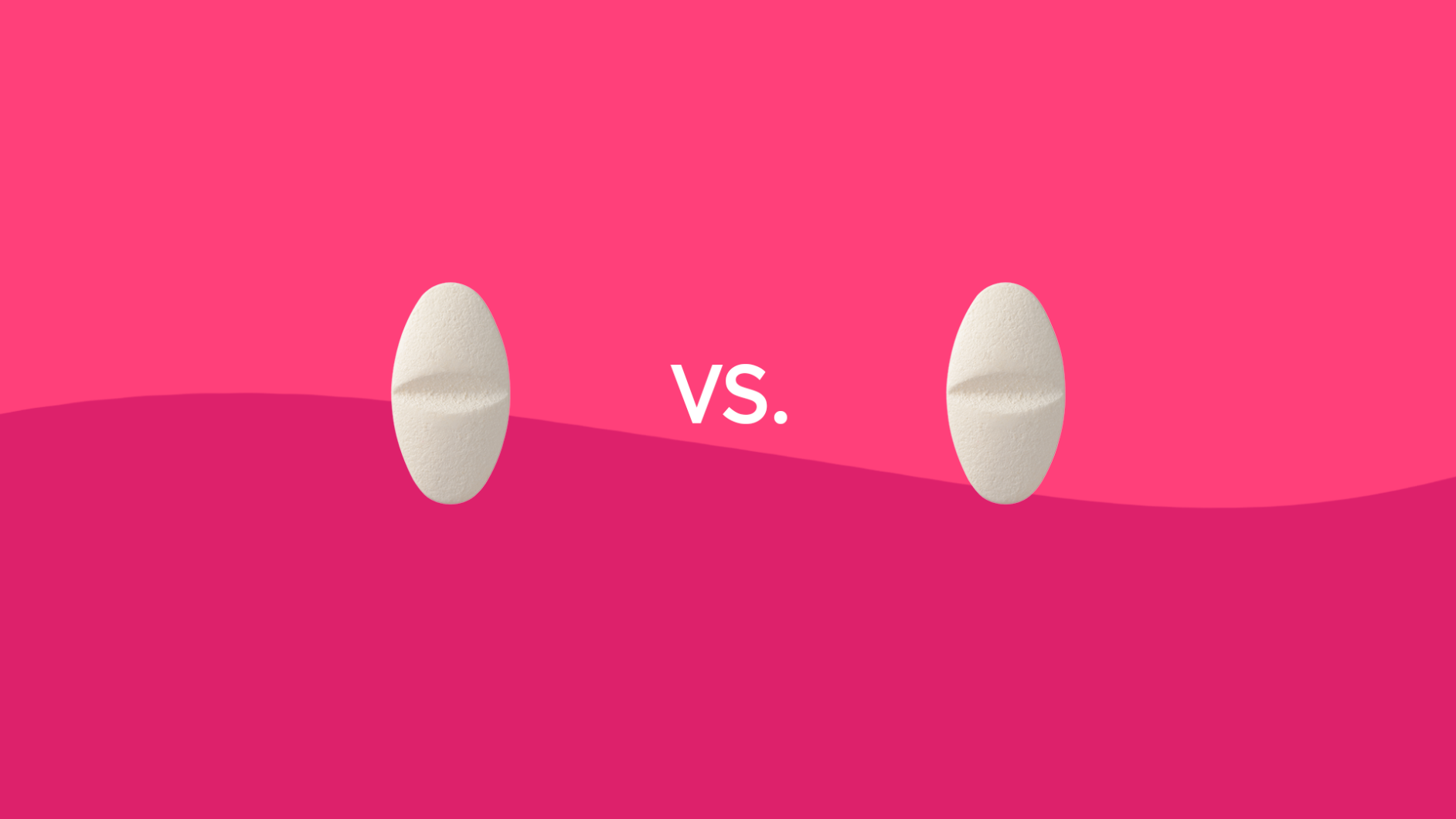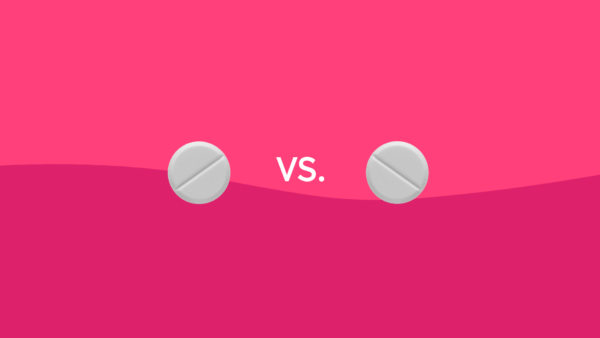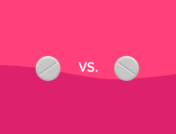Drug overview & main differences | Conditions treated | Efficacy | Insurance coverage and cost comparison | Side effects | Drug interactions | Warnings | FAQ
If you experience depression or anxiety, you are not alone. Major depressive disorder affects 17.3 million American adults every year. Anxiety disorders affect 40 million American adults every year. Two common drugs used for these mental health conditions are Zoloft and Xanax. Zoloft and Xanax are prescription drugs that are approved by the Food and Drug Administration (FDA).
Zoloft (sertraline) is an SSRI (selective serotonin reuptake inhibitor) that is indicated for the treatment of depression and other psychological conditions. An SSRI works by increasing levels of serotonin in the brain, helping improve symptoms.
Xanax (alprazolam) is a benzodiazepine drug, which works in the central nervous system (CNS). Benzodiazepines work by increasing activity at receptors for gamma-aminobutyric acid (GABA), a neurotransmitter. By doing this, benzodiazepines produce a relaxing and calming effect. A dose of Xanax starts working within about one hour, and the effects last for about five hours (the extended-release tablet lasts up to about 11 hours). Because of the potential for abuse and/or dependence, Xanax is a controlled substance and is classified as a Schedule IV drug.
What are the main differences between Zoloft and Xanax?
Zoloft is a selective serotonin reuptake inhibitor (SSRI) and is available in both brand and generic form. The generic name is sertraline. Zoloft is available in both tablet and liquid form.
Xanax is a benzodiazepine available in both brand and generic form. The generic name of Xanax is alprazolam. It is available in tablet form (immediate-release or extended-release) and as an oral concentrate.
| Main differences between Zoloft and Xanax | ||
|---|---|---|
| Zoloft | Xanax | |
| Drug class | Selective serotonin reuptake inhibitor (SSRI) | Benzodiazepine |
| Brand/generic status | Brand and generic | Brand and generic |
| What is the generic name? | Sertraline | Alprazolam |
| What form(s) does the drug come in? | Tablet and liquid | Tablet (immediate-release or extended-release), oral concentrate |
| What is the standard dosage? | Adult dose: 50-200 mg daily (maximum 200 mg per day) Dose for children varies: Average of 25 to 50 mg daily Taper gradually when discontinuing |
Examples: 0.5 mg taken 3 times daily; dosage varies Taper gradually when discontinuing |
| How long is the typical treatment? | Months to years | Short-term; some patients use longer under doctor supervision |
| Who typically uses the medication? | Adults; ages 6 years through 17 years for OCD only | Adults |
Want the best price on Xanax?
Sign up for Xanax price alerts and find out when the price changes!
Conditions treated by Zoloft and Xanax
Zoloft is an SSRI indicated for the treatment of major depressive disorder, obsessive-compulsive disorder, panic disorder, post-traumatic stress disorder (PTSD), social anxiety disorder, and premenstrual dysphoric disorder.
Xanax is indicated for the short-term relief of the symptoms of anxiety, and short-term relief of anxiety associated with depressive symptoms. Xanax is also indicated for the treatment of panic disorder, with or without agoraphobia.
| Condition | Zoloft | Xanax |
| Major Depressive Disorder (MDD) | Yes | No (may be used off-label) |
| Obsessive-compulsive disorder (OCD) | Yes | Off-label |
| Panic disorder (PD) | Yes | Yes (with or without agoraphobia) |
| Post-traumatic stress disorder (PTSD) | Yes | Off-label |
| Social anxiety disorder (SAD) | Yes | Off-label |
| Premenstrual dysphoric disorder (PMDD) | Yes | No |
| Management of anxiety disorders | Yes (see specific anxiety disorders above) | Yes |
| Short-term relief of the symptoms of anxiety | No | Yes |
| Short-term relief of anxiety associated with depressive symptoms | No | Yes |
Is Zoloft or Xanax more effective?
Because Zoloft and Xanax are in different drug classes and treat different conditions, studies do not compare the two drugs head to head. Zoloft is generally used as a longer-term treatment, while Xanax is used as a short-term treatment and has the potential for abuse and/or dependence. Also, either drug may be used as part of a comprehensive treatment plan which includes psychotherapy. Depending on what condition you are treating, one drug may be more appropriate than the other.
The most effective drug for you should be determined by your healthcare provider, who can take into account your medical history, medical conditions, and other medications you take that could interact with Zoloft or Xanax.
Want the best price on Zoloft?
Sign up for Zoloft price alerts and find out when the price changes!
Coverage and cost comparison of Zoloft vs. Xanax
Zoloft is usually covered by both private insurance and Medicare Part D. Generic Zoloft will have a lower copay, whereas brand name may have a higher copay or may not be covered at all. The out-of-pocket cost of generic Zoloft varies but can be as much as $85. With a SingleCare coupon, 30 tablets of 100 mg generic sertraline are less than $10 at participating pharmacies.
Xanax is typically covered by private insurance and Medicare Part D in the generic form of alprazolam. The brand-name Xanax may not be covered or have a high copay. A typical prescription of alprazolam would be for 60 tablets of 0.5 mg can cost around $40 out-of-pocket but less than $10 with a SingleCare coupon at participating pharmacies.
| Zoloft | Xanax | |
| Typically covered by insurance? | Yes (generic) | Yes (generic) |
| Typically covered by Medicare Part D? | Yes (generic) | Yes (generic) |
| Standard dosage | Example: #30 tablets of 100 mg generic sertraline |
Example: #60 tablets of 0.5 mg generic alprazolam |
| Typical Medicare Part D copay | $0-$13 (generic) | $0-$33 (generic) |
| SingleCare cost | $10+ | $8+ |
Common side effects of Zoloft vs. Xanax
The most common adverse reactions from Zoloft are nausea, diarrhea, sexual problems, dry mouth, insomnia, and sleepiness.
Side effects of Xanax usually increase with higher doses. The most common side effects of Xanax are sedation, dizziness, and weakness. Other side effects may include fatigue, lightheadedness, memory problems, confusion, depression, euphoria, suicidal thoughts/attempt, incoordination, lack of energy, dry mouth, convulsions/seizures, vertigo, visual problems, slurred speech, sexual problems, headache, coma, respiratory depression, worsening of sleep apnea or obstructive pulmonary disease, and gastrointestinal symptoms including nausea, constipation, or diarrhea.
Other side effects may occur. Consult your healthcare professional for a complete list of side effects.
| Zoloft | Xanax | |||
| Side effect | Applicable? | Frequency | Applicable? | Frequency |
| Headache | Yes | % not reported | Yes | 12.9-29.2% |
| Nausea | Yes | 26% | Yes | 9.6-22% |
| Diarrhea | Yes | 20% | Yes | 10.1-20.6% |
| Ejaculation disorder/sexual problems | Yes | 8% | Yes | 7.4% |
| Dry mouth | Yes | 14% | Yes | 14.7% |
| Sleepiness | Yes | 11% | Yes | 41-77% |
| Insomnia | Yes | 20% | Yes | 8.9-29.5% |
| Dizziness | Yes | 12% | Yes | 1.8-30% |
| Weakness | No | — | Yes | 6-7% |
Source: DailyMed (Zoloft), DailyMed (Xanax)
Drug interactions of Zoloft vs. Xanax
MAO inhibitors should not be used within 14 days of Zoloft. The combination may increase the risk of serotonin syndrome, a life-threatening medical emergency due to a buildup of serotonin. Triptans used to treat migraines, as well as other antidepressants, should not be used in combination with Zoloft due to the risk of serotonin syndrome. Nonsteroidal anti-inflammatory drugs (NSAIDs) such as aspirin, or anticoagulants such as warfarin, should not be taken with Zoloft because of an increased bleeding risk.
Xanax should not be taken in combination with opioid painkillers, due to increased risk of sedation, respiratory depression, and overdose, possibly leading to death. If no other combination is possible, the patient should receive each medication at the lowest possible dose and for the shortest duration, and be closely monitored. Benzodiazepines also should not be taken with other CNS depressants such as alcohol, antipsychotics, antidepressants, sedating antihistamines, and anticonvulsants.
Alcohol should not be used with Zoloft or Xanax.
Other drug interactions may occur. Consult your healthcare provider for a full list of drug interactions.
| Drug | Drug class | Zoloft | Xanax |
| Phenelzine Rasagiline Selegiline Tranylcypromine |
MAOIs (Monoamine oxidase inhibitors) | Yes (separate use by 14 days) | No |
| Alcohol | Alcohol | Yes | Yes |
| Rizatriptan Sumatriptan Zolmitriptan |
Triptans | Yes | Yes (sumatriptan) |
| Warfarin | Anticoagulant | Yes | Yes |
| St. John’s Wort | Supplement | Yes | Yes |
| Codeine Hydrocodone Hydromorphone Methadone Morphine Tramadol |
Opioid painkillers | Yes | Yes |
| Aspirin Celecoxib Ibuprofen Meloxicam Naproxen |
NSAIDs (nonsteroidal anti-inflammatory drugs) | Yes | No |
| Azithromycin Clarithromycin Erythromycin |
Macrolide antibiotics | Yes | Yes (clarithromycin and erythromycin) |
| Citalopram Escitalopram Fluoxetine Fluvoxamine Paroxetine Sertraline |
SSRI antidepressants | Yes | Yes |
| Desvenlafaxine Duloxetine Venlafaxine |
SNRI antidepressants | Yes | Yes |
| Amitriptyline Desipramine Imipramine Nortriptyline |
TCA (tricyclic antidepressants) | Yes | Yes |
| Baclofen Carisoprodol Cyclobenzaprine Metaxalone |
Muscle relaxants | Yes | Yes |
| Carbamazepine Divalproex sodium Gabapentin Lamotrigine Levetiracetam Phenobarbital Phenytoin Pregabalin Topiramate |
Anticonvulsants | Yes | Yes |
| Diphenhydramine | Sedating antihistamine | Yes | Yes |
| Contraceptives | Contraceptives | Yes | Yes |
| Itraconazole Ketoconazole |
Azole antifungals | Yes | Yes |
Warnings of Zoloft and Xanax
Zoloft:
- Zoloft has a boxed warning, which is the most serious warning required by the FDA. Children, adolescents, and young adults (up to age 24 years old) taking antidepressants have an increased risk of suicidal thoughts and behavior. All patients who take antidepressants should be carefully monitored.
- There is a risk of serotonin syndrome, which is a life-threatening medical emergency caused by the buildup of serotonin. Patients taking Zoloft should be monitored for symptoms of hallucinations, seizures, and/or agitation.
- When discontinuing Zoloft, withdrawal symptoms such as agitation may occur. Patients should taper off the drug very slowly. Your healthcare provider can give you a tapering schedule.
- Zoloft should be used with caution in patients who have seizures.
- There is a risk of hyponatremia (low sodium) due to syndrome of inappropriate antidiuretic hormone secretion (SIADH). Symptoms may include headache, difficulty concentrating, memory impairment, confusion, weakness, and unsteadiness, which may cause falls. Patients should seek immediate treatment if symptoms occur.
- Zoloft should be avoided in patients with angle-closure glaucoma.
- Zoloft may increase the risk of bleeding. This risk increases with the concomitant use of NSAIDs or warfarin.
- Zoloft may precipitate a mixed/manic episode in patients with bipolar disorder.
- Zoloft should only be used in pregnancy if your healthcare provider determines that benefits outweigh risks. Zoloft can cause complications to the baby, especially if taken in the third trimester. If you are already on Zoloft and find out you are pregnant, contact your healthcare provider immediately.
- Zoloft oral solution contains 12% alcohol and thus should not be used while pregnant or breastfeeding.
Xanax:
- Xanax also has a boxed warning. Xanax should not be used in combination with opioids because of the risk of extreme sedation, severe respiratory depression, coma, or death. If the combination of a benzodiazepine and opioid cannot be avoided, the patient should be prescribed the lowest dose for the shortest period of time and be closely monitored. Patients should not drive or operate machinery until effects are known.
- Xanax may cause The risk increases with higher doses, longer duration of use, or a history of drug or alcohol abuse. Also, because patients with panic disorder may use higher doses of Xanax, there may be a higher risk of dependence in these patients. If you take Xanax, take the medication only as prescribed. Do not take additional doses.
- Keep out of the reach of children and others. Keep under lock and key if possible.
- Xanax should be used as a short-term treatment. When discontinuing, it should be slowly tapered to avoid withdrawal symptoms. Patients with seizure disorders are at higher risk for withdrawal symptoms. Your prescriber can provide you with a tapering schedule.
- There is a risk of suicide in patients with depression. Patients with depression should be treated with an antidepressant and should be closely monitored.
- Xanax should be used with caution in patients with breathing problems such as COPD or sleep apnea.
- Use with caution and use lower doses in patients with severe liver problems.
- Xanax should not be used in pregnancy because of the risk to the fetus. If you are taking Xanax and find out that you are pregnant, consult your doctor immediately.
- Xanax is on the Beers’ List (drugs that may be inappropriate in older adults). Older adults have increased sensitivity to benzodiazepines and there is an increased risk of cognitive impairment, delirium, falls, fractures, and motor vehicle crashes in older adults when Xanax is used.
Frequently asked questions about Zoloft vs. Xanax
What is Zoloft?
Zoloft (sertraline) is an SSRI (selective serotonin reuptake inhibitor) indicated for treatment of major depressive disorder, obsessive-compulsive disorder, panic disorder, post-traumatic stress disorder, social anxiety disorder, and premenstrual dysphoric disorder. Other drugs in the SSRI class of medications are Prozac (fluoxetine), Celexa (citalopram), Lexapro (escitalopram), Luvox (fluvoxamine), and Paxil (paroxetine).
Related: Zoloft for anxiety
What is Xanax?
Xanax, also known by its generic name, alprazolam, is a benzodiazepine drug used to treat anxiety and panic disorder. Other drugs in the benzodiazepine category of medications that you may have heard of include Valium (diazepam), Ativan (lorazepam), Dalmane (flurazepam), Restoril (temazepam), Klonopin (clonazepam), and Halcion (triazolam). All of these drugs are approved by the FDA, and are controlled substances like Xanax.
Are Zoloft and Xanax the same?
Zoloft is an SSRI antidepressant indicated for a variety of conditions (see above) and Xanax is a benzodiazepine medication indicated for some of the same, and some different, conditions. The two drugs have many differences, as you can learn about in the sections above.
Is Zoloft or Xanax better? / Is Zoloft safer than Xanax?
Zoloft or Xanax may be used for different indications, so studies do not compare the two drugs directly. It is difficult to make a comparison between the two drugs because they are different and not in the same category of medication. In terms of safety, Xanax does have a risk of abuse and dependence, while Zoloft does not. Drug interactions must be considered as well, as each drug has many potential interactions. Consult your healthcare provider for medical advice.
Can I use Zoloft or Xanax while pregnant?
Zoloft is only given in pregnancy when the benefits outweigh risks (and if no other safer alternative is available). Taking Zoloft in the third trimester can cause complications to the baby. Xanax may cause fetal abnormalities and should not be used during pregnancy. If you are already taking Zoloft or Xanax, and find out that you are pregnant, contact your healthcare provider for guidance.
Can I use Zoloft or Xanax with alcohol?
No. Neither drug should be used with alcohol. Combining an antidepressant, like Zoloft, with alcohol, can worsen the symptoms of depression or anxiety, impair thinking and alertness, and increase the effects of sedation and drowsiness. Combining Xanax with alcohol is dangerous and can cause respiratory depression, extreme sedation, coma, or even death.
Is 25 mg of Zoloft enough for anxiety?
The effective dose of any drug depends on the individual and can be a matter of trial and error. Often, healthcare providers start Zoloft at a dose of 25 mg. Sometimes, this dose is sufficient and other times, if needed, the dose may be slowly increased under the direction of your healthcare provider. Ask your prescriber what dose should be used to treat your condition.
Can Zoloft cause sudden death?
Tricyclic antidepressants such as Elavil (amitriptyline) or Pamelor (nortriptyline) have been associated with heart problems and sudden cardiac death (and should be avoided in patients at risk for arrhythmia or who have heart problems).
SSRIs, like Zoloft, are generally well tolerated and not associated with an increased mortality rate. The manufacturer’s information for Zoloft does recommend that the medication should be used with caution in patients at risk for arrhythmia.
It’s important to note that untreated depression is linked to increased cardiovascular deaths (as well as increased risk of suicide and decreased quality of life). There are a number of factors to consider when starting a new medication, such as the potential for drug interactions with other medications you take. It is best to consult with your prescriber about any cardiac risk factors, and he/she can help you decide what drug is safest for you.
Can Zoloft worsen anxiety?
Zoloft is used to treat depression and certain types of anxiety disorders. However, some people experience increased anxiety or agitation, especially at the beginning of treatment. If you take Zoloft and notice you are feeling anxious or agitated, contact your healthcare provider.
Also, suicidal thoughts can occur in some cases, and the risk is higher in patients up to age 24 years. If you are having suicidal thoughts, seek emergency treatment. Be sure that your loved ones know about the possibility of suicidal thoughts and/or behavior, so they can be alert for any potential issues and help you seek treatment if necessary.





